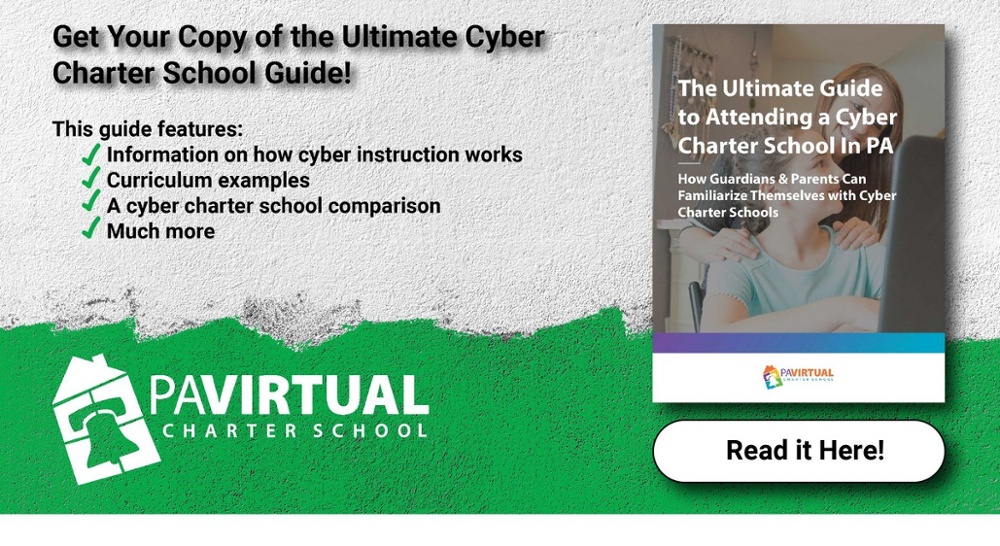For those who are new to the idea of online education, a common concern is whether online school is a good education option. What makes a cyber school student successful? Will your student be able to go to college? If you transferred your child back to a brick and mortar school, would he or she be on target? Can online school challenge your child and support them? Even once you know it can be a good option, you may wonder if your child would excel in a virtual model.
As a PA Virtual graduate, I can attest that online school can be a great education option. It might not be the right fit for everyone, but it is an excellent choice for many students. So how do you know it is the right choice for your family? In this blog, we’ll delve into characteristics often found in successful online students as well as some advice on how to develop these traits.
What Makes a Cyber School Student Successful?
Self-Advocacy
This is a common phrase you may have heard, and it essentially means being able to advocate for yourself. However, in a cyber school, self-advocacy looks like taking responsibility for your education.
Instead of being a passive learner who receives what the teacher instructs, students who self-advocate can take a more active role in their learning. Something in math class isn’t making sense, so they raise their hand. The instructions for the science experiment don’t seem clear, so they send their teacher an email. They’re given an assignment in English class, and they really allow themselves to explore something through that assignment.
One great thing about self-advocacy is that you learn it over time. It may come naturally to some, but students who are new to online learning can always grow to self-advocate. As long as they have a supportive adult pushing them to push themselves, they can really grow in this area.
Discipline
During my first academic evaluation in college, the evaluator described me as “disciplined.” At first, I wasn’t sure what to make of that label. After some thought, however, I realized that my “disciplined” approach to education was rooted in my years at PA Virtual.
Successful online students are disciplined. They do their best to follow the “work now, play later” mantra. When a disciplined student looks at the schoolwork ahead of them, they make a plan. It is much easier to be successful in school if you finish your homework, enjoy your afternoon and evening, get to bed at a reasonable hour, and wake up fresh in the morning. Putting things off to deal with later and pushing assignments back until late at night or the early morning makes learning a struggle instead of something enjoyable.
Discipline is another trait that you can be trained in. I know that if it were not for my Learning Coach, I might have leaned into being a full-time procrastinator. A student may not be a planner when they start out, but with the right encouragement, they can find the discipline to succeed and love learning.
Time Management
One skill brick and mortar school doesn’t wholly require is time management. Students are alerted by the scheduled bells to a change in subject or room. Cyber students, all working from their own homes, don’t have bells. Rather, they have to manage their time on their own.
Online students watch the clock to make sure they get to class on time. They have more open breaks and flexibility. Without time management, assignments would never be completed by the due date. A successful cyber school student has their own “internal bells” which help them to stay on track. Students know themselves and the pace that they work at. Using their time management skills, they can complete assignments on time and at their own pace.
If your student is not used to managing their own time and tasks, they may need more support from their Learning Coach at first. Once your student learns about themselves and what works best for them, they can do it on their own. It is a skill that will serve them for their entire lives, in both their professional and personal lives.
Willingness to Learn
Online school can be a big adjustment. Students who are likely to be frustrated and give up will not be able to find success in an online environment. It takes time to get used to this model of learning.
This is yet another area where the Learning Coach can help model patience. If a student sees their parent or guardian working hard to understand something new, they will be more likely to try that themselves. Armed with the willingness to learn, cyber students have the chance to find success.
Involvement
One of the greatest benefits of online school is the flexibility offered. Successful cyber school students take advantage of the flexibility and make opportunities for themselves outside of school. With an online school, a successful student can say, “I love PA Virtual because of the great teachers, the fun projects, the friends I’ve made, and the chance to do something I couldn’t have done otherwise.” Their success is not only tied to the classroom, but to everything they get to accomplish outside of it.
Best Practices
Perhaps you’ve read over this list of characteristics and it has discouraged you. Your student may not possess these traits yet, and you may not know where to begin in helping your student develop them. Here are some tips to get you started on developing or maintaining the traits of successful cyber students.
Wake up at the same time each day.
Having a regular sleep schedule will help your student have consistency in their education and daily routine. It can help improve their attitude as they tackle something new, and it may assist them as they learn to plan out their days.
Stay organized, in a way that works for you.
I have friends who swear by bullet journals and planners. Personally, I get along better with sticky notes and to-do lists. Find the best way for your student to stay organized. This will empower them to get their assignments done in a timely manner, leading to free time to be involved in things that interest them outside of school.
Keep school in one distraction-free zone.
Over the course of my years at PA Virtual, school moved from the dining room to the back porch to my room. My desk was where my school materials stayed, and this division helped me separate school and home, since I did school from home. This is a great way to develop discipline. When your student is in their school space, they will train themselves to do school.
Take a break!
While you do need to complete five hours of school each day, nobody would recommend five consecutive hours staring at the screen. This is a healthy part of time management: learning to recognize when your brain needs a break, when your body needs to stretch, and when you genuinely would be able to do something more efficiently later.
Use the resources available to you.
As your student learns or further develops self-advocacy, they need to be able to reach out to the people put in place to help them. PA Virtual offers tutoring, office hours, and guidance counselors. If your student ever needs extra support, encourage them to self-advocate.
Now that I’m in college, does success in cyber school even mean anything?
As a successful brick and mortar college student, I feel a large portion of my success came from my history as a successful online student. In college, I have to self-advocate because so much of the learning is active instead of passive. With the constant onslaught of assignments, papers, and exams, I have to be disciplined or I would never keep up. While our campus does have a bell tower, it is entirely up to me to manage my time, including my classes and on-campus employment. When I first came to college, it was my first time being educated in brick and mortar classrooms. There was a learning curve, but I was willing to learn. It wasn’t necessarily my online education that benefited me—although that has often given me an upper hand, as well—but rather the skills I needed to be successful in that model.
If you recognize any of these traits in your student, online education may be one of the best options for your family. If you know these are characteristics your student could work on, online school could still be the best decision for you. It comes down to your willingness to learn, to work hard, and to seek success in this model. The skills you learn to excel at PA Virtual will serve you well in your future.
One PA Virtual graduate shared how these skills prepared her for college and beyond:
“When my college switched to an online format due to the coronavirus pandemic, I wasn't worried because I already had years of experience in the cyber school model! When I was in high school at PA Virtual, I learned a lot about self-discipline. I experimented a lot until I found the method that helped me stay on task and make sure my assignments were done - for me, it was making lists that were color-coded by subject. While I was attending my online college classes, I used this same method to stay focused and succeed in my final semester. Even now, I'm still using those same things I learned at PA Virtual as I navigate the world of job applications and careers.”
-Maggie Shive, Class of 2016
If you'd like to learn more about how cyber school students prepare for college, check out our blog post, "Do Cyber Students Go to College?"
Want more information about cyber schooling? Check out our Ultimate Guide to Attending a Cyber Charter School in PA. This guide will help you weigh the pros and cons of cyber charter schools and help you decide whether the cyber model might be a good fit for your family.
 About the Author: Alexis Dingeldein attended PA Virtual for all of grade school and graduated in 2017. During her time at PA Virtual, she wrote and self-published six novels. She is currently at Geneva College studying business and writing.
About the Author: Alexis Dingeldein attended PA Virtual for all of grade school and graduated in 2017. During her time at PA Virtual, she wrote and self-published six novels. She is currently at Geneva College studying business and writing.






Comments